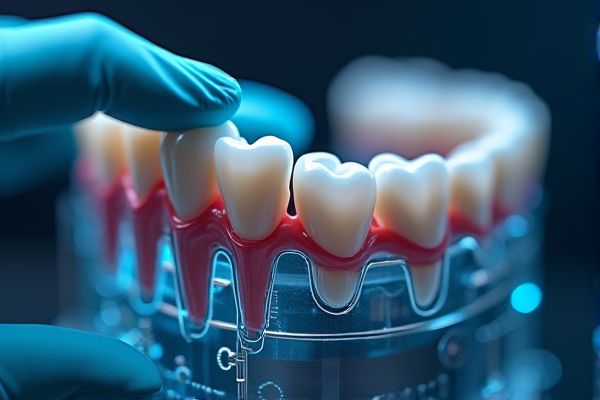
AI technologies enhance diagnostic accuracy in dental health by analyzing X-rays and oral scans for cavities, gum disease, and other dental conditions. Predictive analytics help in personalizing treatment plans based on patient history and risk factors, improving outcomes significantly. Chatbots and virtual assistants provide immediate responses to patient inquiries, streamlining appointment scheduling and follow-up care. Furthermore, AI-driven tools optimize practice management by handling administrative tasks, allowing dental professionals to focus more on patient care.
AI usage in dental health
Diagnostic Imaging Analysis
AI can enhance dental health through advanced diagnostic imaging analysis by detecting conditions like cavities or periodontal disease more accurately. This technology offers the potential for early intervention, potentially reducing the need for extensive treatments later. Institutions like the American Dental Association are exploring AI applications for improving diagnostic capabilities. With the increase in efficiency and precision, dentists may experience a significant advantage in patient outcomes and satisfaction.
Predictive Treatment Planning
AI usage in dental health can enhance predictive treatment planning by analyzing patient data to forecast outcomes. For example, institutions like the American Dental Association are advocating for AI tools that help predict the likelihood of specific dental issues based on historical data. This can lead to more tailored treatment plans, improving patient satisfaction and efficiency. The potential for AI to optimize routine check-ups could significantly reduce the time needed for diagnostics and increase the chances of preventing complex procedures.
Automated Dental Charting
AI can enhance dental health by improving the accuracy and efficiency of automated dental charting. This technology can reduce human error in record-keeping, enabling quicker access to patient histories and treatment plans. A dental practice using AI for charting may find increased workflow efficiency, allowing staff to focus more on patient care. For instance, a practice utilizing a system like Dentrix could see advantages in time management and data retrieval.
Virtual Patient Simulation
AI in dental health can enhance diagnostic accuracy by analyzing imaging data with high precision. Virtual patient simulation offers a cost-effective training tool for dental students, allowing practice on diverse scenarios. This technology can help in predicting treatment outcomes, increasing the likelihood of successful results. Institutions like dental schools have the chance to integrate these innovations to better prepare their graduates for real-world challenges.
Personalized Oral Care Recommendations
AI can analyze patient data to provide personalized oral care recommendations, optimizing dental health outcomes. For instance, a dental clinic may use AI algorithms to tailor advice based on an individual's history of gum disease. This technology increases the likelihood of patients adhering to recommended care routines, potentially improving their overall oral health. With continuous advancements, the chance for AI to further enhance dental practices is significant.
AI-Assisted Dental Surgery
AI-assisted dental surgery shows promise in improving precision and outcomes for patients. By utilizing machine learning algorithms, dentists can analyze patient data to enhance diagnosis and treatment planning. Tools like Teledentistry can integrate with AI to provide remote consultations and personalized care. This technology may lead to reduced recovery times, demonstrating the potential advantages of AI in enhancing dental health services.
Real-Time Consultation and Virtual Assistants
AI in dental health offers the potential for real-time consultations, allowing dental professionals to evaluate patients remotely. Technologies like virtual assistants can enhance patient engagement and streamline appointment scheduling, leading to increased efficiency in practices. For example, platforms like Teledentistry enable patients to receive personalized care without needing to visit a clinic. This can improve access to dental services, particularly in underserved areas, presenting significant advantages for both patients and practitioners.
Disease Progression Monitoring
AI technology can enhance disease progression monitoring in dental health by analyzing radiographic images for early detection of cavities or periodontal disease. Tools like machine learning algorithms can identify patterns in patient data, which may lead to more personalized treatment plans. For example, institutions like the American Dental Association are exploring how AI can assist in diagnosing oral diseases more accurately. This application of AI holds the potential to improve patient outcomes and streamline clinical workflows significantly.
Prosthodontic Design Automation
AI can enhance dental health by improving the accuracy of prosthodontic design through advanced algorithms. Tools such as CAD (Computer-Aided Design) systems can automate the creation of dental prosthetics, potentially reducing the time and effort required by dental professionals. Institutions like the American Dental Association may benefit from adopting these technologies, leading to better patient outcomes and increased efficiency. The chance of personalized treatment plans becomes more feasible with AI integration, tailoring solutions to individual patient needs.
Anomaly Detection and Risk Assessment
AI can enhance dental health by improving anomaly detection in radiographs, allowing for early identification of issues such as cavities or tumors. For example, using machine learning algorithms can enable dental professionals at institutions like the American Dental Association to assess risks associated with treatment options. Predictive analytics can also aid in assessing patient outcomes based on historical data, thus optimizing treatment plans. The possibility of integrating AI in dental practices may lead to more accurate diagnoses and improved patient care.
 techknowy.com
techknowy.com